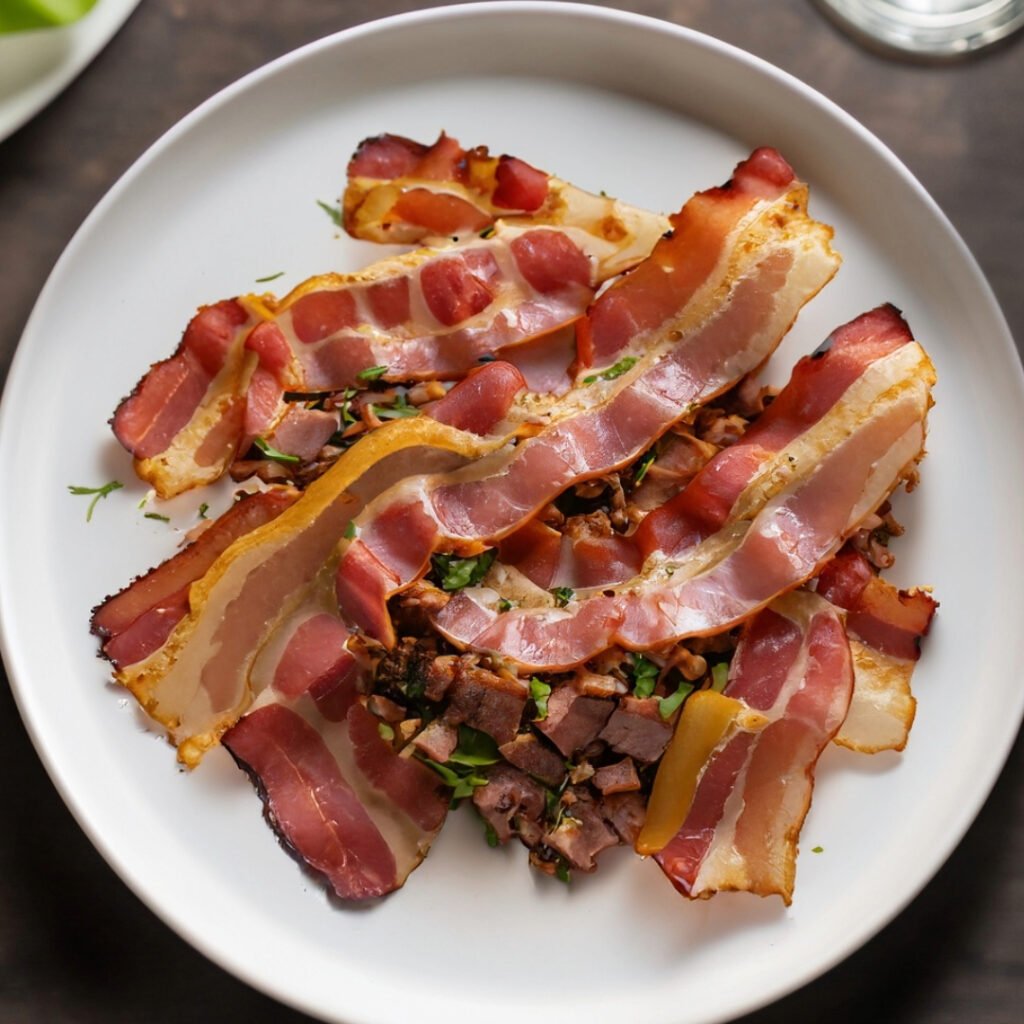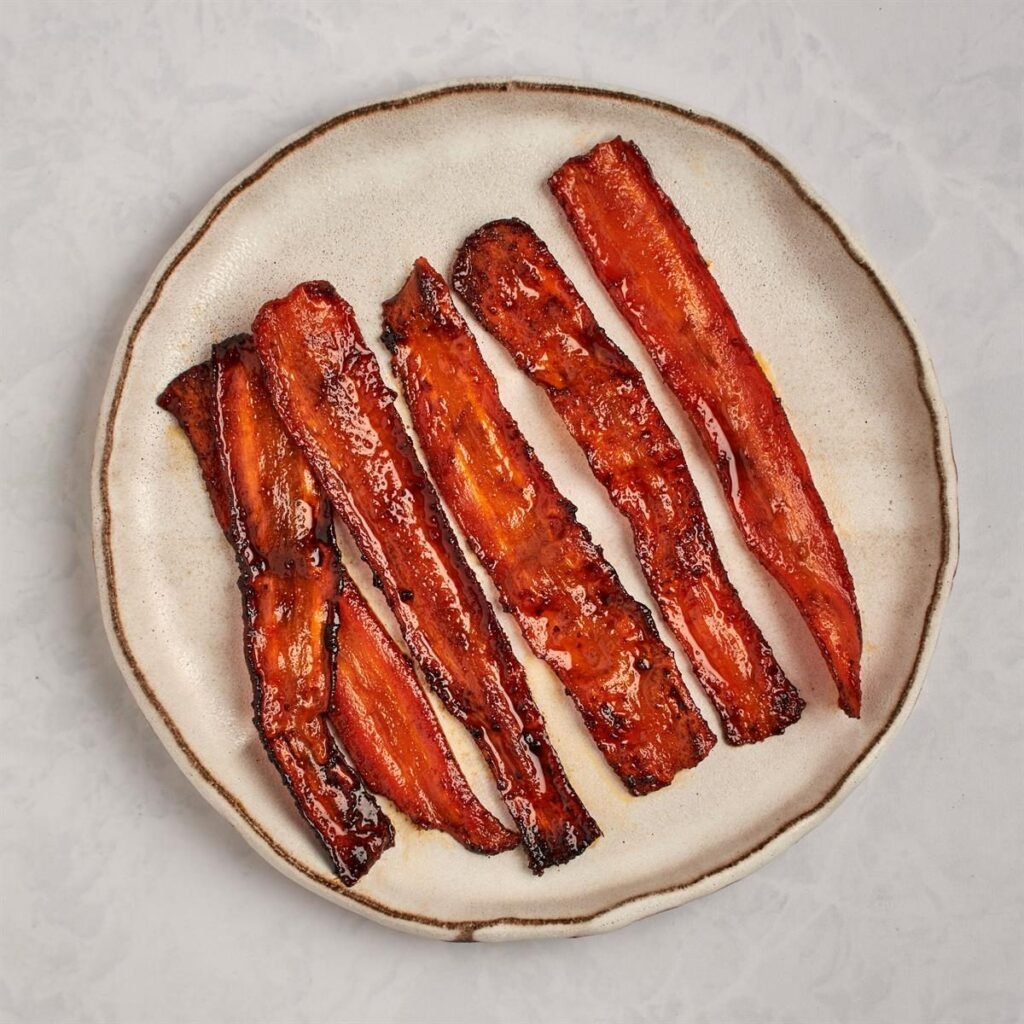Vegan Bacon: A Crispy, Smoky Delight
Bacon, with its crispy texture and smoky, savory flavor, has been a staple in many households for generations. Traditionally made from pork belly, bacon has a unique ability to elevate a dish, whether it’s a simple breakfast plate, a savory sandwich, or even a salad. However, as the world shifts toward more sustainable, ethical, and plant-based diets, a growing number of individuals are searching for alternatives to traditional bacon.
Enter Vegan Bacon: a plant-based alternative that mimics the taste, texture, and experience of its meaty counterpart. With the rise of veganism, plant-based diets, and a growing awareness of environmental and ethical concerns related to animal agriculture, vegan bacon has emerged as an innovative solution that satisfies cravings while promoting a healthier and more sustainable lifestyle.
This article will explore the origins of vegan bacon, the key ingredients that make it so deliciously crispy and smoky, the various methods of preparation, and why this alternative is quickly becoming a go-to option for those seeking a plant-based or cruelty-free lifestyle. From the humble beginnings of vegan substitutes to today’s sophisticated and diverse varieties of vegan bacon, we will delve into how this food revolution is changing the way we eat.
By the end, you’ll not only have a deeper understanding of vegan bacon but also practical insights into how to make, enjoy, and experiment with this incredible alternative.
The Origins of Vegan Bacon
Bacon, in its traditional form, dates back thousands of years. The practice of curing and smoking meat can be traced back to early civilizations, where preserving food was vital to survival. Over time, bacon became synonymous with indulgence, used in everything from breakfast dishes to haute cuisine. However, as more people turned to plant-based diets for health, ethical, and environmental reasons, the quest for a plant-based alternative became a natural next step in food evolution.
Vegan bacon emerged alongside the broader movement of plant-based food products. As veganism became more mainstream in the late 20th and early 21st centuries, food companies and home cooks alike began experimenting with ways to recreate the taste and texture of bacon using plant-based ingredients. The early versions of vegan bacon were often made from soy or tofu, but these alternatives didn’t always replicate the crispy, smoky flavor people were craving.
The true breakthrough came when innovators began using ingredients like tempeh, coconut, rice paper, and mushrooms. These ingredients, combined with clever cooking techniques, allowed for the creation of vegan bacon that was not only delicious but also versatile enough to be used in a variety of dishes. By using methods like marinating, baking, or frying, these plant-based bacons could achieve the smoky flavor and crispy texture that people loved.
The rise in popularity of plant-based alternatives can also be attributed to the increasing awareness of the environmental impact of animal agriculture, as well as concerns regarding the health risks of processed meats. Vegan bacon provides a solution that satisfies the cravings for a classic taste while reducing the negative environmental footprint. With improvements in flavor and texture, vegan bacon has become a staple in many vegan and vegetarian diets, as well as in mainstream markets.

Key Ingredients and How They Mimic Traditional Bacon
The magic of vegan bacon lies in the variety of plant-based ingredients used to replicate the taste, texture, and crispiness of traditional bacon. While there are numerous variations of vegan bacon, the most popular versions share some common key ingredients that work together to produce that familiar savory, smoky, and crunchy experience.
1. Tempeh:
Tempeh, a fermented soy product, is a favorite among many for making vegan bacon. It has a dense texture, which allows it to hold up well to cooking and has a slightly nutty flavor that pairs well with the smoky, salty seasonings used in vegan bacon recipes. When sliced thinly and marinated, tempeh crisps up beautifully when pan-fried or baked, mimicking the texture of traditional bacon strips.
2. Coconut:
Coconut is another common ingredient used in making vegan bacon. Specifically, coconut flakes or chips, when seasoned and baked, can replicate the crispy texture and appearance of bacon. The natural fats in coconut allow the pieces to crisp up nicely, while the addition of liquid smoke and other spices gives it the savory, smoky flavor associated with bacon. Coconut bacon is a popular choice for those looking for a gluten-free or soy-free alternative.
3. Rice Paper:
Rice paper, often used in Vietnamese spring rolls, is another surprising but effective ingredient for vegan bacon. When soaked, seasoned, and fried, rice paper becomes incredibly crispy, offering a texture remarkably similar to the crackly crispiness of traditional bacon. This method is particularly great for creating vegan bacon strips that are crunchy and light.
4. Mushrooms:
Mushrooms, particularly shiitake or portobello varieties, are known for their meaty texture and umami flavor. When sliced thinly and seasoned with soy sauce, smoked paprika, or liquid smoke, mushrooms can offer a savory, smoky alternative to bacon. While mushrooms don’t quite achieve the same crispness as some other ingredients, they provide a more tender, chewy alternative with a depth of flavor.
5. Seitan (Wheat Gluten):
Seitan, made from wheat gluten, is another great choice for creating vegan bacon. It has a chewy, meaty texture that can mimic the bite of traditional bacon. When seasoned and cooked properly, seitan can have a crispy exterior and a satisfying mouthfeel. Seitan bacon is often pan-fried or grilled to achieve that bacon-like crunch and is popular in more substantial vegan recipes.
6. Soy Sauce and Liquid Smoke:
To capture the savory and smoky flavor of bacon, many vegan bacon recipes rely on soy sauce or tamari for saltiness and umami, and liquid smoke for that distinctive smoked aroma. These ingredients help to create the authentic bacon taste that vegan alternatives aim to replicate.
7. Maple Syrup, Agave, or Brown Sugar:
The sweetness that bacon sometimes brings to the table is often attributed to caramelized sugars. To recreate this flavor, many vegan bacon recipes use a touch of maple syrup, agave, or brown sugar to bring a slight sweetness to the dish. This balance of savory and sweet is one of the hallmarks of traditional bacon, and replicating it in a plant-based version helps make the transition to vegan bacon smoother for those accustomed to the real thing.
How to Make Vegan Bacon: Step-by-Step Guide
Making vegan bacon at home can be a fun and rewarding experience. Below is a simple, step-by-step guide on how to make your own crispy, smoky vegan bacon using tempeh and coconut, two of the most popular and delicious ingredients for this dish.
Vegan Bacon with Tempeh:
Ingredients:
- 1 block of tempeh
- 3 tablespoons soy sauce or tamari
- 1 tablespoon maple syrup
- 1 tablespoon apple cider vinegar
- 1 teaspoon smoked paprika
- 1/2 teaspoon garlic powder
- 1/2 teaspoon onion powder
- 1/4 teaspoon liquid smoke
- 1 tablespoon olive oil for frying
Instructions:
- Slice the Tempeh: Start by slicing the tempeh thinly, about 1/8 inch thick. This will help it achieve that crispy texture when cooked.
- Make the Marinade: In a bowl, combine soy sauce, maple syrup, apple cider vinegar, smoked paprika, garlic powder, onion powder, and liquid smoke. Whisk everything together until the marinade is smooth and well-mixed.
- Marinate the Tempeh: Place the tempeh slices in the marinade and let them sit for at least 30 minutes. For a more intense flavor, marinate the tempeh for up to 2 hours.
- Cook the Tempeh: Heat olive oil in a large skillet over medium heat. Once the oil is hot, add the marinated tempeh slices. Cook for 3-4 minutes on each side, until golden brown and crispy. For extra crispiness, you can also bake them in the oven at 375°F for 20-25 minutes, flipping halfway through.
- Serve and Enjoy: Serve your crispy tempeh bacon in sandwiches, salads, or as a topping for a plant-based breakfast.
Vegan Bacon with Coconut:
Ingredients:
- 1 cup unsweetened coconut flakes
- 1 tablespoon soy sauce or tamari
- 1 tablespoon maple syrup
- 1/2 teaspoon smoked paprika
- 1/2 teaspoon garlic powder
- 1/4 teaspoon black pepper
Instructions:
- Prepare the Coconut: Preheat your oven to 350°F. In a bowl, combine the coconut flakes, soy sauce, maple syrup, smoked paprika, garlic powder, and black pepper.
- Mix Well: Stir the mixture well until the coconut flakes are evenly coated with the seasoning.
- Bake: Spread the coconut flakes in a single layer on a baking sheet lined with parchment paper. Bake for 8-10 minutes, stirring halfway through, until the coconut is golden brown and crispy.
- Cool and Serve: Let the coconut bacon cool slightly before serving. It can be used as a topping for salads, baked potatoes, or avocado toast.

The Health Benefits of Vegan Bacon
While vegan bacon isn’t exactly a health food, it does offer several advantages over traditional pork bacon, especially for those following plant-based diets or seeking to reduce their consumption of animal products.
1. Lower in Saturated Fat:
One of the most significant health benefits of vegan bacon is that it contains far less saturated fat compared to traditional bacon. High intake of saturated fat is associated with an increased risk of heart disease, so switching to plant-based bacon can be a heart-healthy choice.
2. Cholesterol-Free:
Traditional bacon contains cholesterol, which can contribute to the buildup of plaque in arteries, leading to cardiovascular problems. Vegan bacon, made from plants like tempeh, coconut, or mushrooms, is naturally cholesterol-free.
3. Higher in Fiber:
Many vegan bacon recipes, especially those made with tempeh or mushrooms, provide a good source of fiber. Fiber helps regulate digestion, lowers blood sugar, and aids in maintaining a healthy weight.
4. Antioxidants and Nutrients:
Vegan bacon can also offer more antioxidants and micronutrients than pork bacon, depending on the ingredients. For example, coconut provides healthy fats, and tempeh is rich in protein and contains beneficial probiotics due to its fermentation process.
Conclusion (200-300 words)
Vegan bacon has evolved from a simple substitute into a sophisticated and satisfying alternative that delivers the smoky, crispy goodness of traditional bacon—without the ethical concerns and environmental impact. Whether you choose tempeh, coconut, rice paper, or mushrooms, there are numerous ways to enjoy this plant-based delicacy. As more people embrace plant-based diets, the demand for innovative vegan options will continue to grow, and vegan bacon stands at the forefront of this movement.
Making vegan bacon at home allows you to experiment with flavors and textures, creating the perfect bacon for your taste. It’s a healthier, more sustainable alternative to pork bacon that can fit seamlessly into a variety of dishes. Whether you’re vegan, vegetarian, or just looking to cut down on your meat consumption, vegan bacon offers a delicious, guilt-free way to indulge in a familiar favorite.
